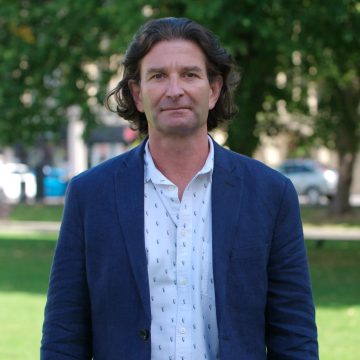
Professor Richard Martin
Theme lead for Diet and physical activity
Workstream lead for Clinical diet and physical activity

Richard Martin is a Professor of Clinical Epidemiology, Deputy Head of Bristol Medical School and Head of Population Health Sciences at Bristol Medical School. He is also co-lead of Bristol BRC’s diet and physical activity theme.
His research interests focus on focus on cancer aetiology and mechanisms, early detection, and treatment of early disease.
Cancer aetiology and mechanisms
Richard established and leads an £11.9 million cancer aetiology and early-detection programme, the Cancer Research UK-funded Integrative Cancer Epidemiology Programme (ICEP, 2015-2025). ICEP has accelerated the use of genetic approaches to establish causally relevant cancer risk-factors (e.g. obesity, physical activity, circadian-disruption) and identified novel molecular mechanisms (e.g. proteins, metabolites), predictive biomarkers (e.g. DNA methylation for early lung cancer detection) and chemoprevention agents (e.g. statins, anti-diabetic targets). He developed a new framework for assessing mechanistic studies, used in the World Cancer Research Fund’s policy-influencing systematic reviews.
Early detection
Richard leads the world’s largest randomised prostate cancer screening trial (CAP; n=415,357; £5.5M), demonstrating that PSA-testing does not reduce prostate cancer mortality but over-detects indolent- and under-detects lethal-cancers (JAMA 2018, JAMA 2024). These findings changed UK, USA, and European (France, Germany, Italy) screening policies.
Prevention and treatment of early disease
Richard co-leads the diet and physical activity theme of the Bristol BRC (10 staff, 2021-2027; £1.2M) and co-leads the cancer work package within that theme. Bristol BRC’s cancer work package collaborates with the Bradford Institute for Health Research to engage South Asian men in co-developing physical activity interventions for men with localised prostate cancer on androgen deprivation therapy so that we can prevent the adverse metabolic effects of that therapy.
He is an epidemiology lead/co-investigator of ProtecT, the only randomized trial comparing active monitoring, prostatectomy and radiotherapy for prostate cancer, showing high 10-year survival irrespective of treatment and changing NICE guidance (NG131, 2019).
Understanding how to improve outcomes for South Asian men with prostate cancer
Theme Diet and physical activity
Workstream Clinical diet and physical activity
Exploring drug targets to treat and prevent cancer
Theme Diet and physical activity
Workstream Clinical diet and physical activity